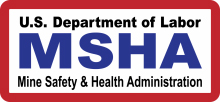MSHA awards grant money for safety education, training
The Mine Safety & Health Administration (MSHA) awarded $400,000 in funding through its Brookwood-Sago grant program to support education and training to help identify, avoid and prevent unsafe working conditions in and around the nation’s mines.
The fiscal-year 2019 grants focus on powered haulage safety (such as reducing vehicle-on-vehicle collisions, increasing seat belt use and improving conveyor belt safety), emergency prevention and preparedness, examinations of working places at metal and nonmetal mines, or other programs to prevent unsafe conditions in and around mines.
Funding enables grant recipients to develop training materials, provide mine safety training or educational programs, recruit mine operators and miners for the training, and conduct and evaluate the training, MSHA says.
Established by the Mine Improvement & New Emergency Response Act of 2006, the program promotes mine safety in honor of 25 miners who died in 2001 in Brookwood, Alabama, at the Jim Walter Resources No. 5 mine, and in 2006 in Buckhannon, West Virginia, at the Sago Mine.
The five programs receiving grant funding are these:
• Hutchinson Community College in Hutchinson, Kansas, received $50,000 to develop a powered haulage training module, including virtual reality simulation, that will focus on powered haulage-blind spot safety and workplace examinations.Penn State University in University Park, Pennsylvania, received $158,181 to plan, design and develop a three-module, web-based mobile equipment safety education and training program on the potential hazards associated with mobile equipment visibility; designing and maintaining berms; and performing proper, thorough pre-shift examinations per the equipment manufacturer’s specifications.
• The United Mine Workers of America Career Centers in Prosperity, Pennsylvania, received $50,000 to develop a video and companion training documents emphasizing mine rescue team exploration and recovery procedures.
• The University of Arizona in Tucson, Arizona, received $85,974 to develop modular training programs for workplace examinations, conveyor and mobile equipment interactions, and mine emergency preparedness, with a focus on small- and medium-sized metal and nonmetal mines. The training program will include an evidence-based, train-the-trainer and evaluations program.
• West Virginia University Research Corp. in Morgantown, West Virginia, received $55,845 to provide emergency prevention and preparedness training to coal miners and operators in the areas of self-contained self-rescuer expectations and mine rescue.










